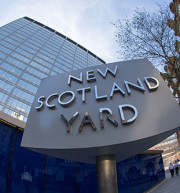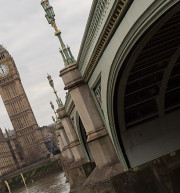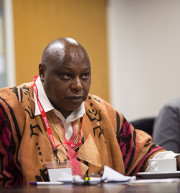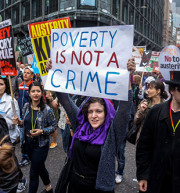
Special Rapporteur Maina Kiai undertook an official mission to the United States of America July 11-27, 2016. The visit was carried out pursuant to his mandate to assess the situation of freedoms of peaceful assembly and association in the country. At a press conference at the end of his visit on July 27, 2016, the Special Rapporteur called the United States "a nation of struggle and resilience," but noted that the country was currently "struggling to live up to its ideals on a number of important issues." The most critical of these issues, he said, were racial, social and economic inequality. Although the focus of his mission was not race or discrimination, the Special Rapporteur said that it was impossible to discuss assembly and association rights without issues of racism pervading the discussions. “Racism and the exclusion, persecution and marginalization that come with it, affect the enabling environment for the exercise of association and assembly rights,” Kiai said, noting that understanding its context means looking back at 400 years of slavery and post-Civil War Jim Crow laws which “enforced segregation and marginalized the African-American community to a life of misery, poverty and persecution.” In more recent times, the Special Rapporteur noted, “old philosophies of... Continue reading →

GENEVA / WASHINGTON, DC – The United States of America is struggling to live up to its ideals in the area of racial, social and economic inequality, which is having a negative impact upon the exercise of the rights to freedom of peaceful assembly and of association, United Nations human rights expert Maina Kiai said at the end of his first official fact-finding mission to the country. The UN Special Rapporteur on the rights to freedom of peaceful assembly and of association singled out race as a particularly pernicious issue. He emphasised that while his mandate does not cover racial discrimination, it was impossible carry out his mission “without issues of racism pervading the discussions.” “Racism and the exclusion, persecution and marginalization that come with it, affect the enabling environment for the exercise of association and assembly rights,” Mr. Kiai said, noting that understanding its context means looking back at 400 years of slavery and post-Civil War Jim Crow laws which “enforced segregation and marginalized the African-American community to a life of misery, poverty and persecution.” In more recent times, the Special Rapporteur noted, “old philosophies of exclusion and discrimination were reborn, cloaked in new and euphemistic terms,” such as the so-called “War on... Continue reading →

WASHINGTON, DC – First let me thank the Government of the United States of America for inviting me to undertake this official mission here from 11 to 27 July 2016. I would also like to thank the Government for its cooperation in organizing the mission, which was extremely fruitful, illuminating and timely. I had productive exchanges with numerous officials at the federal, state and local levels. I appreciate their contributions and inputs which have greatly assisted me in better understanding the situation regarding the rights to freedom of peaceful assembly and of association in the United States today. Let me also thank the US Government for the crucial role it played in establishing and renewing my mandate and its consistent support for it at the UN Human Rights Council. I also commend the US for the key role it has played at the Council in general, including in relation to the adoption of resolutions on peaceful protests, civic space, LGBT rights and many more issues. During my visit, I have met with hundreds of activists and individuals representing a wide range of perspectives, observed a number of protests at the Republican and Democratic national conventions, and more. I want to thank everyone who took the time to meet with me and share their stories. The diversity, energy and dedication... Continue reading →

WASHINGTON / GENEVA – United Nations Special Rapporteur Maina Kiai will visit the United States of America from 11 to 27 July 2016 to make an in-depth assessment on the extent to which the rights to freedom of peaceful assembly and of association are enjoyed in the country. Mr. Kiai’s visit will be the first information-gathering mission to the United States by an independent expert mandated by the UN Human Rights Council to monitor and promote the realization of the rights to freedom of peaceful assembly and of association worldwide. “The United States was the main driving force behind the establishment of my mandate in 2010, and its recent renewal for another period of three years,” the expert noted. “This visit will give me an unique opportunity to gather first-hand information on any good practices developed at the federal and state level in relation to the exercise of the rights falling under my mandate, but also to examine existing challenges in this regard, and advise the authorities how to overcome these”, he said. During his sixteen-day visit, at the invitation of the Government, the Special Rapporteur will travel to Washington DC; New York, NY; Baltimore, MD; Ferguson, MO; Cleveland, OH; Phoenix, AZ; New Orleans, LA; Jackson, MS; and Philadelphia, PA, where he will meet with... Continue reading →

If you’ve been following our newsletter, you’re probably aware that Special Rapporteur Maina Kiai will be making an official visit to the United States of America from July 11-27, 2016. Kiai is visiting at the invitation of the US Government, so that he can make an in-depth assessment of the country’s promotion and protection of the rights to freedom of peaceful assembly and of association. The Special Rapporteur will meet with government officials, civil society and others, traveling to Washington, DC, and a number of other cities throughout the country. He’ll then hold a press conference announcing his preliminary findings in Washington, DC, on July 27. The situation surrounding assembly and association rights US presents a number of intriguing and important issues. But the US is also a big country: 50 States, 318 million people and nearly 10 million square kilometers. That makes it hard to cover everything and meet everyone in roughly two weeks. To that end, the mandate is putting out a general call for information ahead of the mission. What are the most pressing issues related to assembly and association rights in the United States at the moment? What issues do you think the Special Rapporteur should look into? What would you like to see covered in the final report? How to submit:... Continue reading →

Special Rapporteur Maina Kiai undertook his second official visit to the United Kingdom of Great Britain and Northern Ireland from April 18-21, 2016, as a follow-up to his official visit to the United Kingdom in 2013. The visit was carried out pursuant to his mandate to assess the situation of freedoms of peaceful assembly and association in the country. At a press conference at the end of his visit on April 21, 2016, the Special Rapporteur noted that the UK takes its role as one of the global leaders in human rights seriously, but cautioned against a series of domestic measures that have resulted in the “closing of space for civil society." “I am concerned about a series of separate measures by the Government – some implemented and others proposed – which, put together, suggest that the Government has a negative view of civil society," he said in his concluding statement. “These moves have, in many instances, been subtle and gradual, but they are unmistakable and alarming.” He highlighted in particular the Government’s focus on countering “non-violent extremism” without a narrow and explicit definition of the term. He specifically referred to the Prevent strategy which focuses on individuals and groups that appear contrary to the “British Values” of democracy, pluralism and... Continue reading →

LONDON – The UN Special Rapporteur on the rights to freedom of peaceful assembly and of association, Maina Kiai, warned today against a series of measures resulting in the “closing of space for civil society in the UK”, at the end of a four-day visit to the country. The Special Rapporteur highlighted that the UK takes its role as one of the global leaders in human rights seriously and added that “many people around the world look to the UK as a model for democracy and human rights” and emphasised that “the UK truly should consider its civil society a national treasure.” He noted a number of his 2013 recommendations had been implemented and commended the Government for its continued willingness to constructively engage on human rights in general and on the rights to freedom of peaceful assembly and of association in particular. “I am concerned about a series of separate measures by the Government - some implemented and others proposed - which, put together, suggest that the Government has a negative view of civil society. These moves have, in many instances, been subtle and gradual, but they are unmistakable and alarming,” said the expert. The Government’s focus on countering “non-violent extremism” without a narrow and explicit definition was worrisome, Mr Kiai noted. He... Continue reading →

LONDON - I would like to once again thank the Government of the United Kingdom (UK) for inviting me to undertake this official follow-up visit from 18 to 21 April 2016, which is a follow up to my initial visit in January 2013. This is the first follow-up mission I have conducted during my tenure as Special Rapporteur, and I commend the Government for its continued willingness to constructively engage on human rights in general and on the rights to freedom of peaceful assembly and of association in particular. It is clear that the UK takes its role as one of the global leaders in human rights seriously. Many people around the world look to the UK as a model for democracy and human rights. The world notices when this country takes positive steps to strengthen its practice of human rights. But it notices even more when it moves in the opposite direction – restricting the space for democracy and human rights. Let me thank the Government for its excellent cooperation in organizing the mission, short as it was. A remarkable number of meetings were set up with members of the executive and legislative branches, and independent institutions, over the past four days. The input and assistance of these officials was extremely helpful. Given the brevity of the visit, I only looked at the situation in... Continue reading →

GENEVA – The United Nations Special Rapporteur on the rights to freedom of peaceful assembly and of association, Maina Kiai, will visit London from 18 to 21 April 2016 as a follow-up to his official visit to the United Kingdom in 2013. “This visit will give me an opportunity to follow-up on my recommendations and look at any good practices in relation to the exercise of the rights to freedom of peaceful assembly and of association developed by the authorities since my last visit, but also examine remaining challenges in this regard, and advise them how to overcome these,” Kiai said. “I look forward to a renewed constructive dialogue with all the stakeholders I am due to meet,” the independent human rights expert noted. The Special Rapporteur, who is visiting at the invitation of the UK Government, will stay in London where he is due to meet officials and members of Parliament, as well as representatives of independent institutions, including the national human rights commission, and of civil society. The Special Rapporteur will share his preliminary findings and recommendations at a press conference on Thursday 21 April at 1 pm at the Foreign Press Association, Award House, 7-11 St Matthew Street SW1P 2JT, London. Access to the press conference is strictly limited to journalists. A... Continue reading →

SEOUL – United Nations Special Rapporteur Maina Kiai today commended the Republic of Korea’s “impressive achievements,” but underlined that its journey to democracy is not yet over. At the end of his first official visit to the country, Mr. Kiai warned that the democracy project is still being threatened by a decline on the rights to freedom of peaceful assembly and of association. “The project of building democracy and human rights in South Korea is not over; indeed it never truly is, in any nation,” said the independent expert mandated by the UN Human Rights Council to monitor and promote the realization of the rights to freedom of peaceful assembly and of association worldwide. “What we have is a structure, and our solemn task as governments and citizens is to continually build upon that structure, strengthening the foundation and cultivating its resilience.” While the Special Rapporteur applauded the Government’s many human rights achievements, he also highlighted “a trend of gradual regression on the rights to freedom of peaceful assembly and of association – not a dramatic shutdown of these rights, but a slow, creeping inclination to degrade them.” Mr. Kiai said that undue restrictions are seeping into every stage of the peaceful assembly process in South Korea, despite... Continue reading →